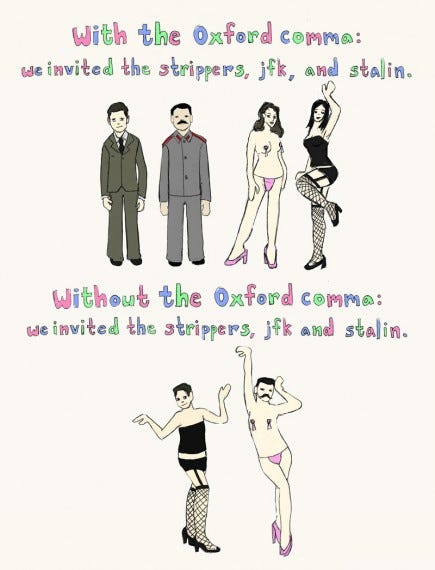
I have a beef. A beef with the Oxford Comma.
People love to take sides. I’ve mentioned it previously.
And I love to come right in the middle and debunk everything, as usual. Because nitpicking is one thing I do very well.
Let’s take the example of the Oxford Comma. There are people that love it (Team Oxford Comma) and people that don’t use it (Team Not-Oxford-Comma).
I recently bumped into the below meme, by one of the members of Team OC (it’s an old tweet, but it checks out):
Under it, someone posted this other meme:
Which is, of course, a new take on the classic “strippers, JFK and Stalin” joke (below).
Now, technically Team OC is right, because given those exact sentences, the meaning differs when you use the Oxford comma versus when you don’t use the Oxford Comma.
However, I will bring another argument to the table: The English Language.
The English Language is extremely flexible, as Jorge Luis Borges used to say, and the main reason for that is its mixture of both Latin and Germanic registers.
I will say that given The English Language, we don’t need the Oxford Comma if we write correctly. It is redundant and useless.
Case in point. Let’s write that first phrase textually, without the Oxford comma, as it was originally written (NOC):
Ayesha Curry, cookbook author, social media maven, mother and wife to NBA superstar Stephen Curry.
Because the phrasing is erroneous, the phrase’s meaning changes if you use Oxford Comma vs if you don’t.
OC:
Ayesha Curry, cookbook author, social media maven, mother, and wife to NBA superstar Stephen Curry.
In the NOC version, we understand Ayesha is both the mother and the wife of Stephen Curry, while in the OC version, the intended meaning of the sentence is reflected, telling that she is a mother and the wife of Stephen Curry.
I blame this on bad phrasing, because if written correctly, the Oxford Comma becomes irrelevant.
Ayesha Curry: mother, social media maven, cookbook author and wife to NBA superstar Stephen Curry.
Her name should not be followed by a comma because her name is not part of the enumeration - only the elements coming after her name are, because they all refer to her. So the mistake here is the existence of a comma, not the absence of one. Replacing the comma with a colon gives the correct sense to the sentence and leaves no room for interpretation.
In this rephrasing of the original sentence, the meaning remains the same regardless of the usage of the Oxford Comma, as it is pretty obvious she can’t be Stephen Curry’s cookbook author, as Stephen Curry is not a cookbook (if you try to cling to the literal interpretation), nor has he ever published a cookbook (if you try to cling to the idea she would have ghost written for him).
In the same vein, and perhaps even clearer, the sentences from the two subsequent pictures can be rephrased (correcting also the plural for rhinoceros, which in English is rhinoceroses):
We invited the rhinoceroses: Washington and Lincoln. (if you seek the meaning of “we invited the rhinoceroses, whose names are Washington and Lincoln”)
We invited the rhinoceroses, Washington and Lincoln. (if you seek the meaning of “we invited everybody”)
We invited the strippers: JFK and Stalin. (the strippers, whose names are JFK and Stalin)
We invited the strippers, JFK and Stalin. (everybody)
Conclusion: The Oxford Comma is pretty much useless if the phrasing is correct, because the “and” itself stands as the final component in an enumeration.
If you do include the subject in the phrasing, then it needs to be separate from the object enumeration, as only the objects are part of the actual enumeration, the subject itself is not.
Examples:
We invited the strippers, JFK and Stalin. (everybody - there is no subject, these are all enumeration objects)
We invited the strippers: JFK and Stalin. (the strippers, whose names are JFK and Stalin - the subject is the strippers, while the objects of the enumeration are JFK and Stalin)
Final Conclusions:
Always phrase your enumerations of such nature that the meaning will stay the same regardless if you use or not the Oxford Comma.
If you can’t abide by Rule #1, then make sure you either use or don’t use the Oxford comma, but choose the correct option, that which conveys the intended meaning. Normally, you shouldn’t reach this conundrum, because if the phrasing is correct, you shouldn’t need the Oxford Comma.







